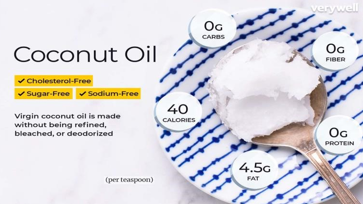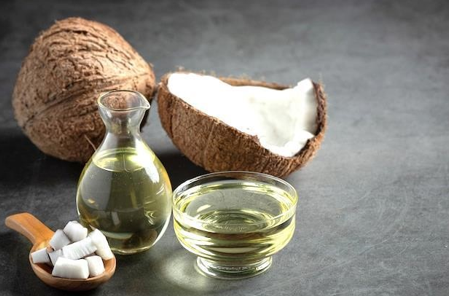Coconut oil
(Botanical name: Cocos nucifera)
Introduction
Coconut meat is the source of coconut oil, a plant-based fat. Its claim to fame is that it is one of only plant-based oils that is solid at room temperature due to its high levels of saturated fat. Many people appreciate its neutral, somewhat sweet flavour as well as the added crispiness it can give to cooked meals.Coconut oil has recently gained a lot of popularity and is frequently promoted as a healthy substitute for animal fats like butter and lard. However, according to the most recent studies, coconut oil should be consumed in moderation just like any other saturated fat.
Nutritional Content:
- Calories 104
- Protein 0 grams (g)
- Fat 11.5 g
- Saturated fat 9.6 g
- Carbohydrates 0 g
- Fiber 0 g
- Sugar 0 g
- The following nutrients and minerals are found in coconut oil:
- Lauric acid
- Myristic acid
- Palmitic acid
- Monounsaturated fats
- Polyunsaturated fats
- Plant sterols
- Medium-chain triglycerides (MCTs)

Benefits:
- Benefit for Hair: you have probably seen shampoos and conditioners that boast coconut oil as a primary ingredient. Coconut oil might offer additional benefits for your tresses and scalp. A study from 2021 revealed that applying the oil to the scalp could promote healthy bacteria and fungi as well as decrease flaking–both of which might reduce dandruff.
- Benefit for Skin: The lauric acid that makes up such a large portion of coconut oil’s saturated fats is known for its antimicrobial activity, which could have benefits for the skin. In addition to its potential for healing inflamed skin, coconut oil is simply an effective moisturizer.Not surprisingly, it is a common addition to lotions and creams.
- Help in Weight Management: Some research indicates that smaller doses of coconut oil could be a useful part of a weight loss regimen. The medium-chain triglycerides (MCTs) coconut oil contains do not get stored in fatty tissues like long-chain fats. Meanwhile, some studies indicate that MCTs might also help decrease waist and hip circumference, especially when they replace long-chain fatty acids in the diet. Unlike animal fats, such as butter, beef tallow, or lard, coconut oil has a place on a plant-based diet. Whether you are vegan, vegetarian, or simply want to incorporate more plant foods into your eating plan, this oil won’t interfere with your plans.
Risks:
- Coconut oil still contains calories, and eating more than your body needs will likely result in weight and fat gain.The American Heart Association recommends that only 5-6 percent of your total daily calories should come from saturated fats. One tablespoon of coconut oil contains about 12 grams of saturated fat, so it could be easy to overdo it on saturated fats if you get more than one serving. Too much saturated fat can lead to high cholesterol, increasing risks of heart disease and stroke.
- A true allergic reaction to coconut oil may appear as symptoms like wheezing, itching, hives, or vomiting. If you notice these symptoms after eating coconut oil, talk to a healthcare provider about the possibility of an allergy.
How to Eat?
In beauty routine
- As a conditioner. Shampoo your hair as normal and then comb coconut oil through your hair, from the midsection to the ends.
- As a post-wash detangler. After shampooing and conditioning your hair, rub a little coconut oil through your hair to protect it while you brush it.
- As a hair mask. Rub coconut oil through your hair and let it sit for a few hours (or even overnight) before washing it out.
- As a pre-wash hair protector. Rub coconut oil through your hair before you wash it.
- As a scalp treatment. Before bed, massage a small amount of coconut oil into your scalp. Leave it overnight and wash it off with shampoo in the morning.
These techniques can be used regularly or once in a while (depending on your hair type) to give you beautiful, healthy, and shiny hair. The amount of coconut oil you’ll need will depend on your hair length and type.
On skin, coconut oil can be used as a lip balm or as a body moisturizer. Parents can be confident about slathering it on their kids’ skin, too.
In cooking and baking: Since one tablespoon (14 grams) of coconut oil equals around 117 calories, it’s best to limit yourself to around two tablespoons (28 grams) a day. Keep in mind that this leaves little room for other saturated fat sources, such as butter or shortening. Here are several cooking ideas:
- Sautéing or stir-frying: Use 1–2 tablespoons of this oil to cook vegetables, eggs, meat or fish.
- Popcorn: Drizzle melted coconut oil on air-popped popcorn or try it in this stove–top popcorn recipe.
- Baking: Use it to coat poultry or meat before rubbing with seasonings.
- Coconut oil can be substituted for oil or butter in a 1:1 ratio in most recipes. Be sure to let cold ingredients like eggs or milk come to room temperature before blending it in, so it mixes in smoothly instead of clumping.
- It’s best to melt it and add to smoothies, and protein shakes gradually.
- Another way to take this oil is in coffee or tea. Aim for a small amount — about a teaspoon or two.
Precautions:
- When taken by mouth: Coconut oil is commonly consumed in foods. But coconut oil contains a type of fat (saturated fat) that can increase cholesterol levels. Like all saturated fats, it should be consumed in moderation. Coconut oil is possibly safe when used as a medicine short-term. Taking coconut oil in doses of 10 mL two or three times daily for up to 12 weeks seems to be safe. When applied to the skin, Coconut oil is likely safe when applied to the skin.
- Pregnancy and breast–feeding: Coconut oil is commonly consumed in foods. There isn’t enough reliable information to know if coconut oil is safe to use as medicine when pregnant or breast-feeding. Stay on the safe side and stick to food amounts.
- High cholesterol: Coconut oil contains a type of fat that can increase cholesterol levels. Regularly eating meals containing coconut oil can increase levels of low-density lipoprotein (LDL or “bad”) cholesterol. This might be a problem for people who already have high cholesterol.
Frequently Asked Questions!
Q1. Is it healthy to eat coconut oil every day?
Ans: Coconut oil is rich in saturated fat, which can increase cholesterol and heart disease risk. The average person should limit the amount of saturated fat to 13 g per day. One tablespoon of coconut oil contains nearly 10 g of saturated fat. Make sure your total saturated fat consumption from coconut oil and other sources (meat, dairy) falls within this limit.
Q2. Is coconut oil good for keto?
Ans: Coconut oil is considered keto friendly, and many people consume it while on the diet. The oil is high in fat (about 12 g per tablespoon) and contains no carbohydrates.
Q3. Does coconut oil reduce belly fat?
Ans: There is inconsistent data to suggest that coconut oil can be useful for weight loss or reducing belly fat. What’s more, coconut oil is rich in calories, and overconsuming calories can cause weight gain.
Q4. Is coconut oil good for cooking?
Ans: Absolutely. Refined (or all-purpose) coconut oil has a neutral flavor and high smoke point of 400 degrees F, making it a good choice for cooking or baking.
Q5. What is the difference between virgin and nonvirgin coconut oil?
Ans: Virgin coconut oil has a distinctive taste and a lower smoke point than refined coconut oil, so it doesn’t hold up as well in higher-heat cooking.
Q6. Is Coconut oil a “seed” oil?
Ans: No. In oil trading, seed oils are considered to be those from annual crops. Common and predominant ones used in North America are Soybean, Corn, Canola, Safflower, Sesame seed, and Sunflower seed oil.
Q7. What are the attributes of coconut oil?
Ans. Coconut oil is one of the most stable oils and is highly resistant to rancidity. It is stable because of its high proportion of saturated fats. (It is the unsaturated fats in the common seed oils that are easily oxidized and susceptible to rancidity.) Coconut oil is mild on the skin and is widely used in the tropics to protect both skin and hair from the harsh effect of the sun. Film forming qualities allow it to act as a skin moisturizer and protects against moisture loss. Its natural detergency and lathering capabilities give a double purpose as a cleansing agent for soaps and shampoos.
Q8: How should I store virgin coconut oil? Does it need to be refrigerated?
Ans. Because coconut oil has such low moisture content and no contaminants, it is very stable. Therefore, it is not necessary to refrigerate this oil. If you do refrigerate coconut oil it will become hard and you will need to warm the oil for scooping it out of the jar. The most important thing in storing coconut oil is to keep it out of direct sunlight or high heat. We do not recommend a damp place such as moist basements. The best place to store coconut oil is a cupboard or closet that does not get too hot in the summer. If you store this oil on top of your hot water heater it will always be a liquid for you. If you keep it where it is cooler, it will always be solid. A pantry, closet or shelf in your kitchen will work fine. At room temperature, your virgin coconut oil will easily last two years in your pantry. The manufacturers say it has a three-year shelf life.
References
- Quealy, K. and Sanger-Katz, M. Is Sushi ‘Healthy’? What About Granola? Where Americans and Nutritionists Disagree. New York Times. July 5, 2016.
- Eyres L, Eyres MF, Chisholm A, Brown RC. Coconut oil consumption and cardiovascular risk factors in humans. Nutrition reviews. 2016 Apr 1;74(4):267-80.
- Neelakantan N, Seah JY, van Dam RM. The Effect of Coconut Oil Consumption on Cardiovascular Risk Factors: A Systematic Review and Meta-Analysis of Clinical Trials. Circulation. 2020 Mar 10;141(10):803-14.
- The Sudden Demise of Coconut Oil, 2015’s Favourite Superfood, by ewey C. 7 March 2018. The Washington Post.
- Wu JHY, Sacks FM, Lichtenstein AH, and others. The American Heart Association’s Presidential Advisory on Dietary Fats and Cardiovascular Disease. Availability. June 2017.
- The Properties of Lauric Acid and Their Importance in Coconut Oil, Dayrit FM. American Oil Chemists’ Society Journal, January 2015.
- McCarty MF, and JJ DiNicolantonio. Lauric Acid-Rich Medium-Chain Triglycerides May Have Limited Pathogenicity and Can Replace Other Oils in Cooking Applications. July 2016. Open Heart.
- Dayst FM. The Qualities of Lauric Acid in Coconut Oil and Their Importance. American Oil Chemists’ Society Journal, January 2015.
- Persaud D, Keis K, et al. Investigation of Different Oils’ Capabilities to Penetrate Human Hair Fibres. Magazine of Cosmetic
Want to Know More?
Contact Our Expert Healthcare Professionals for further Understanding of your Disease!

